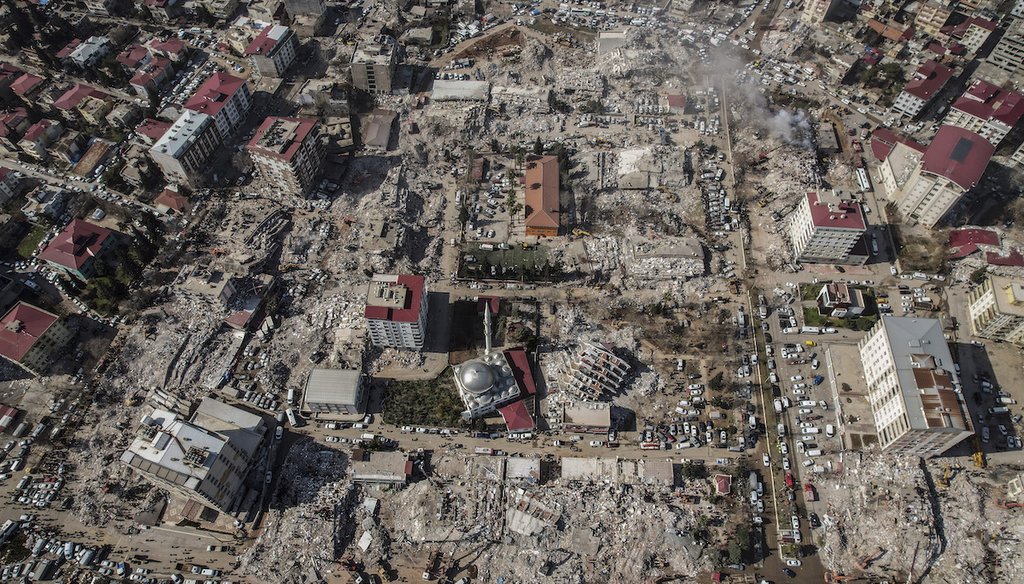

Our only agenda is to publish the truth so you can be an informed participant in democracy.
We need your help.


Aerial photo showing the destruction in Kahramanmaras city center, southern Turkey, on Feb. 9, 2023. Thousands who lost their homes in a catastrophic earthquake three days earlier huddled around campfires. (AP)
The 7.8-magnitude temblor that killed more than 20,000 people in Turkey and Syria was no earthquake, but an orchestrated attack on Kurdish people, an Instagram user claimed.
"According to a firsthand source I have in Istanbul, Turkey, this ‘earthquake’ is a systemic attack against Kurdish people, who are anti-Islam," read the post, published Feb. 6, the day of the earthquake.
Explaining the theory, the post claimed that the Kurds are anti-Islam, Turkish President Tayyip Erdogan doesn’t want to lose power in an election year and that cities hit by the quake are Kurdish areas.
The post, which was later removed, was flagged as part of Meta’s efforts to combat false news and misinformation on its News Feed. (Read more about our partnership with Meta, which owns Facebook and Instagram.)
The post is false and ridiculous.
There’s no question that an earthquake and its devastating aftershocks are what caused the growing death toll, and that natural factors triggered the quake.
"There is no chance that this tragic event was induced by humans," said James Gaherty, a professor in the School of Earth and Sustainability at Northern Arizona University. "This region is known to host natural events of this size and scope. It is undoubtedly a natural event."
Let’s first unpack some of what the post said aside from the earthquake.
The Kurds are one of the indigenous peoples of the Middle East and are predominantly Sunni Muslims, according to the Council on Foreign Relations, a New York-based think tank.
Americans might be most familiar with the Kurds in Syria. In 2014, a U.S.-led international coalition partnered with Kurdish forces to fight the rise of the Islamic State, or ISIS, terrorist group in Syria.
In Turkey, a Kurdish separatist group has waged an insurgency since 1984 against Turkish authorities, including Erdogan, mainly seeking to establish an independent Kurdish state, according to the Council on Foreign Relations.
Erdogan is up for reelection in May.
Now, to earthquakes.
An earthquake occurs when two blocks of the Earth suddenly slip past one another. The surface where they slip is a fault.
Geophysicist Lisa Wald, a spokesperson for the U.S. Geological Survey, told PolitiFact that the area around the Feb. 6 earthquake is "a very seismically active area, since it is in the region of the plate boundaries of three different tectonic plates." The quake was caused "by the plates moving slowly and their edges getting locked for a long time, and then the forces finally overcoming the friction and the plate edges suddenly slipping," she said.
It's the same kind of quake that occurs along the San Andreas Fault in California, NPR reported.
Since 1970, only three earthquakes of magnitude 6 or larger have occurred within 250 kilometers (155 miles) of the Feb. 6 earthquake, the Geological Survey said.
The quake devastated areas as far as 200 miles from the epicenter, including Diyarbakir, the world's biggest Kurdish city and the unofficial capital of Turkey’s eastern Kurdish regions, The New York Times reported.
Hmans can trigger temblors, though none as big as the one on Feb. 6.
Earthquakes can be induced by such human activity as surface and underground mining, and injecting fluids into underground formations, according to the Geological Survey.
Wald said wastewater injection after hydraulic fracturing, or fracking, for example, can trigger small- to moderate-sized earthquakes in a location "where there was a fault poised to have an earthquake already." The largest earthquake from this activity was around a magnitude 5, she said.
An Instagram post that was later taken down said: "This ‘earthquake’ is a systemic attack against Kurdish people." The claim was that there was a politically motivated attack and no earthquake.
Experts said there is no question that a 7.8-magnitude temblor on Feb. 6 is responsible for more than 20,000 deaths in Turkey and Syria.
We rate the post Pants on Fire!
RELATED: Photo shows Game of Thrones characters, not victims of earthquake in Turkey, Syria
Instagram, post (archived), Feb. 6, 2023
Lead Stories, "Fact Check: Turkey's Massive Earthquake Is Not Political Attack -- It's A True 7.8 Magnitude Temblor," Feb. 7, 2023
NPR, "Here's what we know about what caused the Turkey earthquake," Feb. 7, 2023
The Washington Post, "What triggered the Turkey quakes? Why was the second so big? Key questions, answered," Feb. 7, 2023
The Washington Post, "Toll from quakes passes 20,000; U.N. aid convoy enters Syria from Turkey," Feb. 9, 2023
U.S. Geological Survey, "What is an earthquake and what causes them to happen?", accessed Feb. 8, 2023
U.S. Geological Survey, "Can we cause earthquakes? Is there any way to prevent earthquakes?", accessed Feb. 8, 2023
U.S. Geological Survey, "M 7.8 - Central Turkey," accessed Feb. 8, 2023
U.S. Geological Survey, "The Science of Earthquakes," accessed Feb. 8, 2023
The New York Times, "Mapping the damage from the earthquake in Turkey and Syria," Feb. 6, 2023
The New York Times, "The U.S.-Kurd alliance in Syria has a tangled history," Jan. 26, 2023
Email, James Gaherty, professor, School of Earth and Sustainability, Northern Arizona University, Feb. 8, 2023
Email, Ryan Porter, associate professor, School of Earth and Sustainability, Northern Arizona University, Feb. 8, 2023
Email, geophysicist Lisa Wald, spokesperson for the U.S. Geological Survey, Feb. 9, 2023
In a world of wild talk and fake news, help us stand up for the facts.
